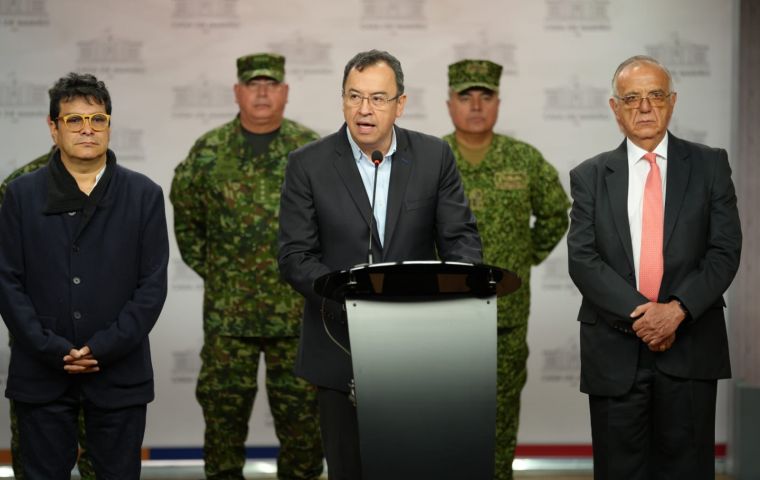MercoPress. South Atlantic News Agency
No truce with ELN, Colombian gov't now says
 The ceasefire remains effective regarding the other rebel groups, Prada said
The ceasefire remains effective regarding the other rebel groups, Prada said Colombia's government Wednesday announced it was suspending its previous decision to decree a truce with the National Liberation Army (ELN) guerrillas after the rebel organization denied having agreed to it.
The administration of President Gustavo Petro repealed Saturday's decree regarding a bilateral ceasefire but said the issue would be discussed in the next round of talks in Mexico.
“Given the position publicly assumed yesterday [Jan. 3] we decided to suspend the legal effects of the decree that had established a bilateral truce with the ELN from January 1 to June 30,” Interior Minister Alfonso Prada said during a press conference.
He also pointed out that such a decision had stemmed from “the imperative call of the ethnic-territorial and peasant communities to maintain the bilateral ceasefire and non-violence in their territories.”
“The delegation of the ELN dialogues has not discussed with the Government of Gustavo Petro any proposal for a bilateral ceasefire, therefore there is still no agreement on that matter,” the armed group said in a statement on Tuesday.
“A unilateral decree by the government cannot be accepted as an agreement,” the ELN insisted. The organization added that “only what was announced regarding the institutionalization of the Table [of Peace Dialogues] was agreed” upon in Venezuela between Nov. 21 and Dec. 12, 2022, when Petro’s left-wing administration and the ELN made changes to the agenda established in 2016 when the Colombian State signed a peace deal with the extinct guerrilla Revolutionary Armed Forces of Colombia (FARC). On Dec. 31, Petro announced a ceasefire with five armed groups from January 1 to June 30.
In 2016, the government signed an agreement with the FARC, but some FARC dissidents, the ELN, and paramilitary and drug trafficking groups continue to operate, as Petro insists on his “total peace” plan, seeking to bring an end to nearly six decades of armed conflict, which killed at least 450,000 people from 1985 to 2018 alone. The Indepaz research institute recorded nearly 100 massacres last year.
“Only when we have the conditions of the protocols totally agreed can we lift the suspension,” said Prada, who also pointed out that the ceasefire remained effective regarding the other four groups: FARC dissidents known as the Estado Mayor Central and Segunda Marquetalia, the Gulf Clan and the Self-Defense Forces of the Sierra Nevada. The ELN has about 3,500 fighters across Colombia, according to official estimates.
On Nov. 4, Petro signed the peace law to enter into negotiations with the armed groups operating in the country.




Top Comments
Disclaimer & comment rulesCommenting for this story is now closed.
If you have a Facebook account, become a fan and comment on our Facebook Page!